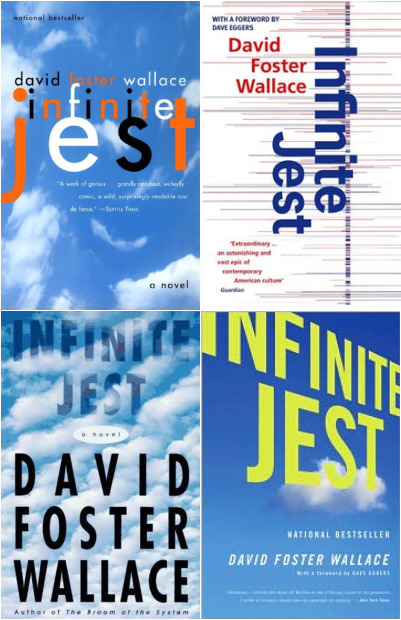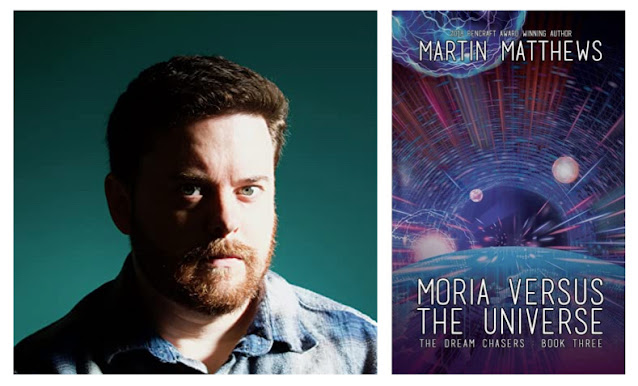Katherine Briggs joins the podcast to discuss her new novel The Eternity Gatea fantasy novel about a handmaiden named Seyo who has a key that will unlock the fate of her kingdom. Along with discussing the novel, this conversation goes into Katherine's writing process and her thoughts on the pressure that writers face in today's publishing industry.
9.28.2023
Ep 96: Author Katherine Briggs on her novel The Eternity Gate
11.23.2021
Ep 89: Author Martin Matthews on his Dream Chasers Trilogy
Martin Matthews is the author of four published novels, including The Dream Chasers trilogy and the Pencraft Award-winning The Graveyard Girl and the Boneyard Boy. The final book of his trilogy, Moria Versus the Universe, was just released in November 2021. Martin is a friend of mine (Chris) and we have had numerous discussions over the years about writing, the creative process, God, grief, not feeling like we belong anywhere, being consummate curmudgeons, politics, and schmolitics. Our conversation for this episode continues in that line, though here he goes into detail about the world building of his trilogy of novels, how it is a meditation on the possible future of humanity, and why exactly Stephen King is an utter failure (you heard it here first!). Martin came along in my life at a particularly pivotal moment. I was transitioning out of a job and had no idea where I was going. As our friendship formed he offered me a lot of encouragement and the simple excitement of talking with someone about writing, creativity, and all the ideas that fill our heads. For that I will always be grateful.
You can discover more about Martin at his website: https://martinmatthewswrites.com/ or purchase his books through his Amazon author page.
Ep 15: Mike Foster Tolkien Scholar and Author
Ep 79: Dr. Michael Ward on C.S. Lewis, Paganism, and Christmas
Ep 69: Ex Mormon Ministry Found Lynn Wilder
Ep 68: E. Byron Anderson on his book Common Worship
Ep 62: Stephen Backhouse on the Life of Kierkegaard
Ep 45: Religion and Philosophy Professor Brooks McDaniel
8.15.2013
Infinite Jest: A Typical Reading Experience
 I have been reading Infinite Jest by David Foster Wallace for quite some time now. I have not talked or written about it much. Simply put, I have not really even known how to. Most of the time, while reading it at home, I just stop, look up at my wife, and say only with my facial expression "there's no way I can even talk to you about what I'm reading".
I have been reading Infinite Jest by David Foster Wallace for quite some time now. I have not talked or written about it much. Simply put, I have not really even known how to. Most of the time, while reading it at home, I just stop, look up at my wife, and say only with my facial expression "there's no way I can even talk to you about what I'm reading". In the purest sense I can think of, reading this novel has been a singular experience. Perhaps this is true of all literature; that reading is a solitary act consisting of not merely going over a story from point to point but of immersively enjoying the art of logically strung together words over the course of a narrative. But I have a feeling David Foster Wallace in his writing meant to give us a particular kind of "singular experience" that can only be experienced in the thing itself, making it imperative to read over every word; a kind of work that could be recounted in various anecdotes to someone who has read it as well ("Do you remember the part when Hal...") but as soon as one begins the description of any one scene they immediately begin to realize the inadequacy of their recounting and are then drawn to just go to the section itself and read it aloud. Meaning, Wallace wrote a novel that cannot simply be talked about (or for that matter made into movie or TV show), but has to be read.
 |
| If only we could have gotten inside DFW's head... |
And but so the reason I am writing this blog post is that in the current passage of Infinite Jest I am reading, something just happened to me as a reader that continues to happen again and again throughout the book: my reading of the text breaks down and I have to consult something outside the text in order to help me to comprehend the text. Now, all good literature should be challenging and have words that extend beyond any reader's current vocabulary; this is part of the joy of reading, this act of discovery. But I am beginning to think that Wallace actually intended for his readers to have this constant breaking down when engaging his text(s), because for me I could potentially have a "reading breakdown" every 2-4 pages. Let me explain.
6.20.2012
Summer To-Do List Part 1: My (hopeful) Summer Reading List
Since I am a school teacher and headmaster, summertime basically means one thing: I finally get to do all the things I have not had time for throughout the year. So far, I have done a lot of around the house type things, like installing some built in bookshelves but also some fun things like competing in a tennis tournament and stringing my first tennis racquet. One of my big projects this summer is releasing some of the music I have recorded online as well as recording some new music for another project I am starting (more on this in a future post). But one "project" equally important as my music is my summer reading list. During the school year I simply have no time to read the books I want to read. Nearly all of my evenings are caught up in lesson planning and reading ahead for my Literature/History/Bible class (which we assign the fancy-schmancy term of “Omnibus”).




